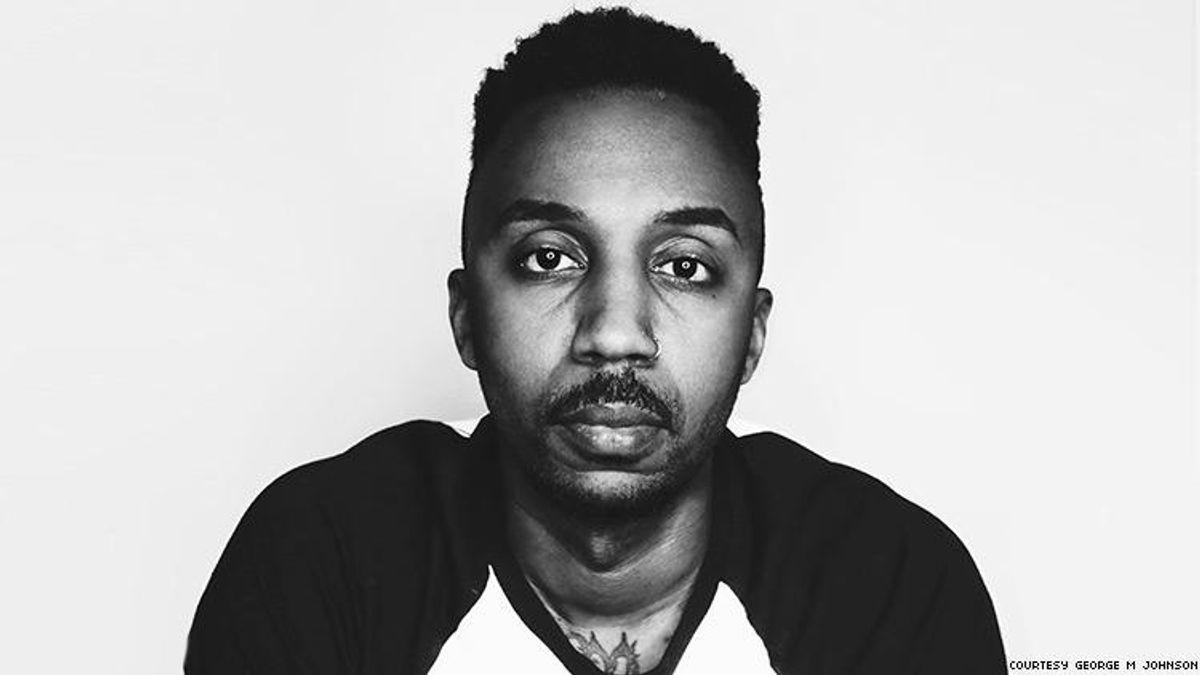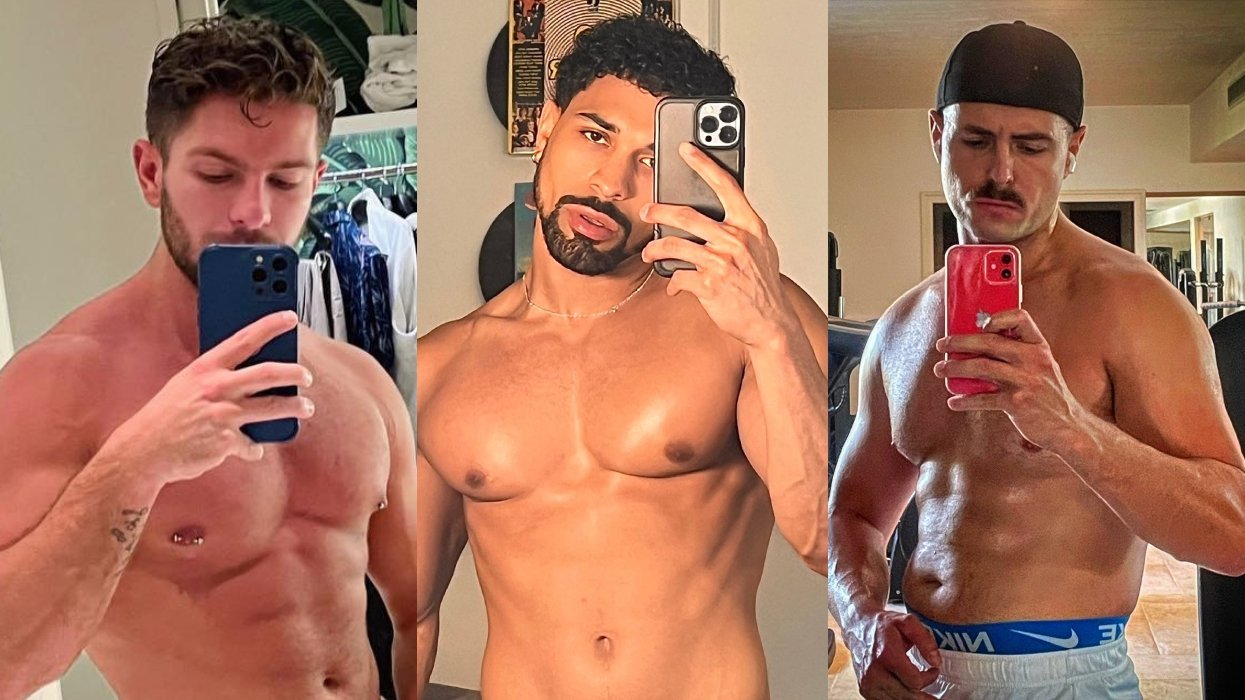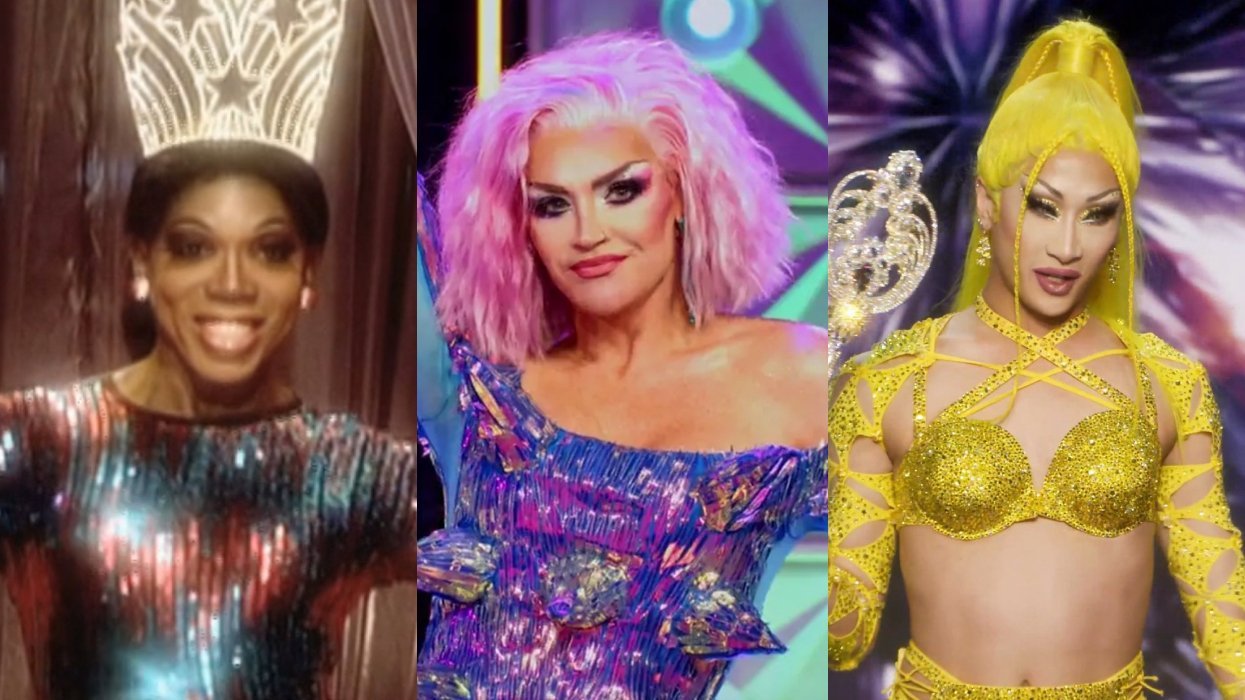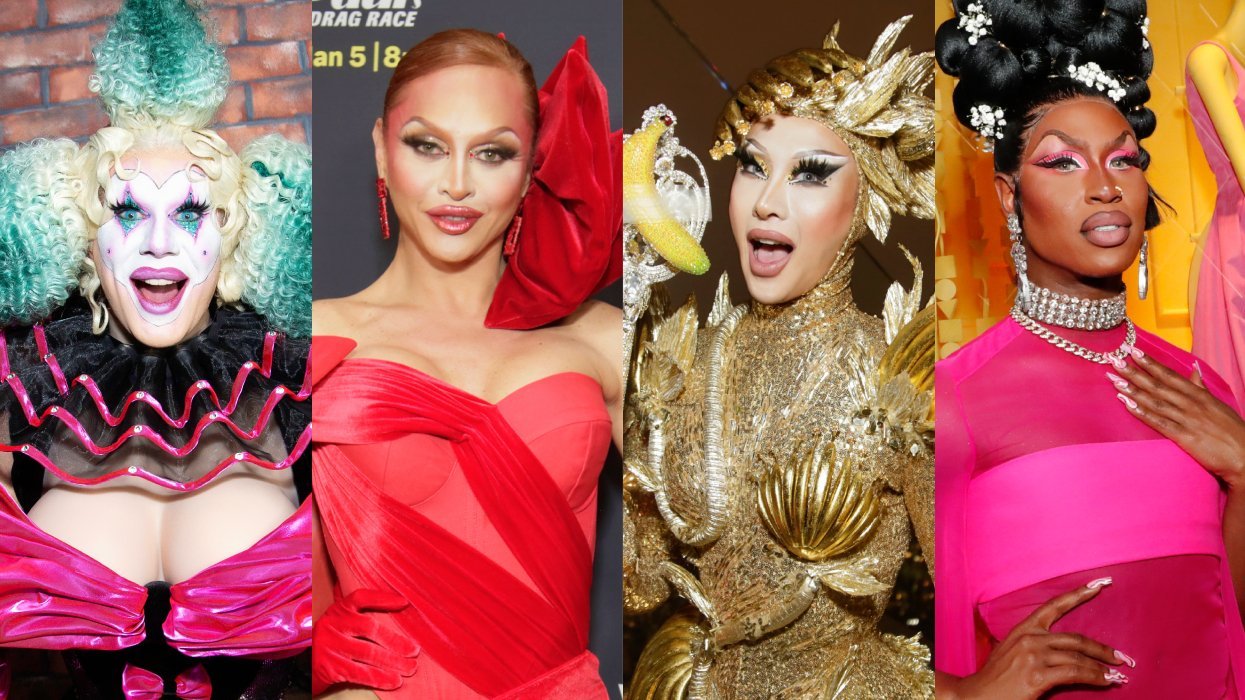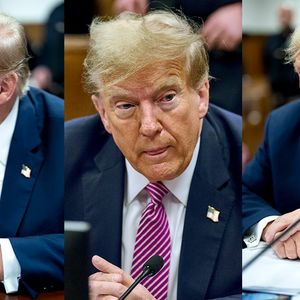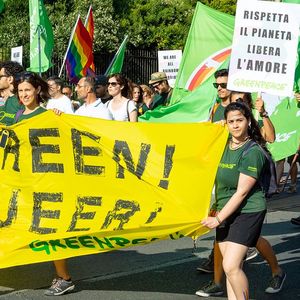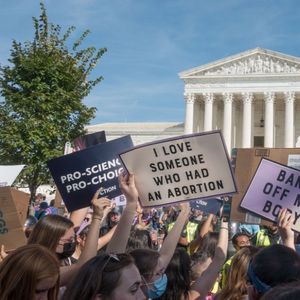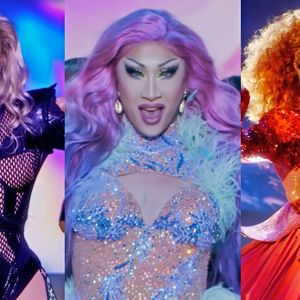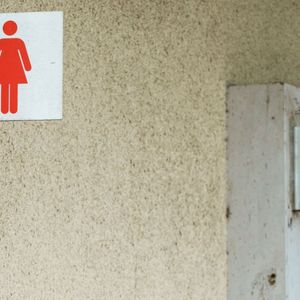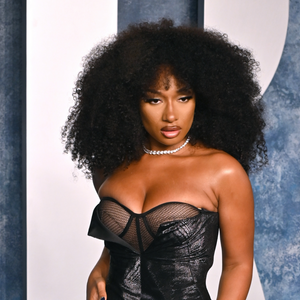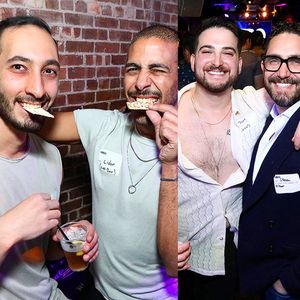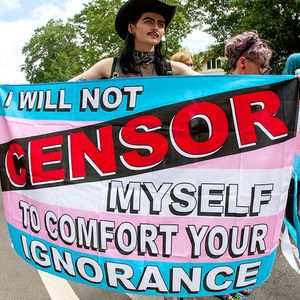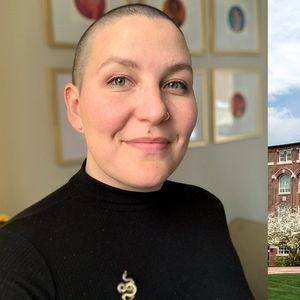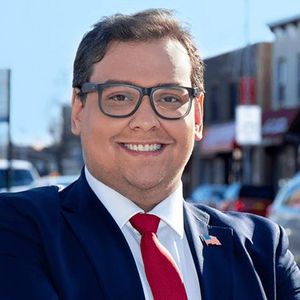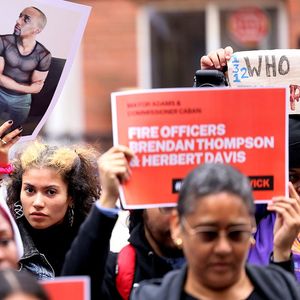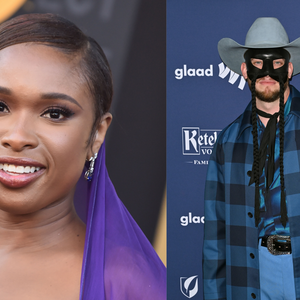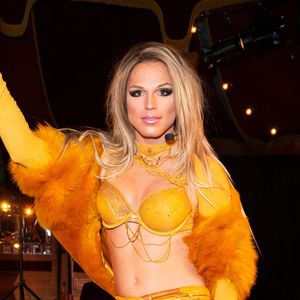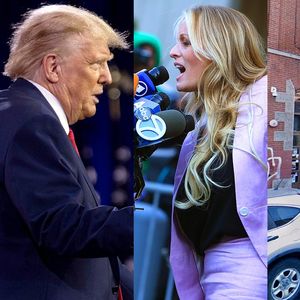The late activist and writer Joseph Beam once deemed the act of a Black man loving another Black man a "revolutionary act." I imagine that doing so, while also living unapologetically with HIV, is doubly insurgent. But that's perhaps the only way to describe the life and work of George M. Johnson. A writer, activist, and soon-to-be author, he's committed to the work of toppling the patriarchy, challenging anti-Blackness, and confronting homophobia, transphobia, and HIV stigma wherever he sees it.
With over 40,000 Twitter followers and a much larger community that reads his words at Teen Vogue, Entertainment Tonight, The Root, Ebony, and countless others, Johnson is outspoken and defiantly visible as a Black gay man living with HIV, with which he was diagnosed at 25. Now, he's set on being the resource he wishes he had when he was younger for other folks who are or might become HIV positive.
On National Black HIV/AIDS Awareness Day, Out spoke to Johnson about his activism, the state of HIV advocacy, and what those living with the virus and those not can do to combat stigma.
After you were diagnosed, what made you decide to become an activist. You obviously didn't have to.
I actually became passionate about HIV work simply because I knew the best kind of activism is when you're almost fighting for yourself. People often wonder, "How does your activism start?" and it is often because it's something that I'm seeing as a problem for me. And once I start speaking out about the problems I'm dealing with, you start to realize that you're not the only one dealing with that problem. You then, in turn, become a major voice for people who don't necessarily have the words or have the best way to articulate some of the things that they're dealing with.
For me, it was about how I navigate this public identity as a piece of myself. If I'm wanting people to be more transparent and I'm wanting to get rid of shaming, I'm wanting to get rid of stigma, how can I do that if I'm not putting all of my chips out there, too? Putting it all on the line for everyone to see how it actually looks like when a person is HIV positive and has to navigate that space publicly. So, a lot my passion came from advocating for myself, and then just meeting so many other people who were living in silence. I just felt it's my duty to be this vessel ... and that, in some way, the only way we can break the stigma is if I become bigger than what the epidemic has stereotyped Black and brown people to be.
In the almost 10 years since you were diagnosed, what has changed about how we talk about HIV or testing?
One of the big things that I always say that changed is that people don't have that much fear for the epidemic or contracting HIV as they have for the stigma and the shame that comes along with it. I always talk about the Magic Johnson effect that happened with HIV because when he first stated that he was HIV positive, the world was like, "Oh, wait a minute. This virus can get anybody." Twenty-something years later, people still see him living and thriving. It's changed the epidemic from being a "death sentence" into something that's more manageable.
We've also had treatment options changed. We went from AZT and the thirty pills a day and the drug cocktail to one pill a day. The virus is no longer transmittable if you're undetectable. We now have PrEP. There're are so many other things that has happened with the epidemic for the advancement of it, but we still don't have a cure. And we still don't have proper access to care for everybody, and we still don't have proper utilization for those who do have access. The perceptions that this is still a threat have changed, and for some people it really has and for some communities it really hasn't ... We have to be very careful when we just tell that line about how it's not what it was before, because it is still deadly and it is still dangerous and it is something that still needs to be a high priority on everybody's list.
You mentioned that there still is a stigma around being HIV positive. How do we combat that?
Part of it is just how HIV has been painted, as something that happens when people are sexually disobedient, as something that is harming certain communities because it's against "God's will." And people can use these terms like, "Oh, you're not clean," or, "You're dirty," and so, I do honestly feel like the best way to combat stigma is for people like myself and others to be more vocal and to be more transparent to show that we have dating lives, that we have careers, that the perception of what has been created publicly of what HIV is supposed to look like, sound like, and be like is not the truth.
Part of the work is also in breaking the stigma that this is just a gay virus and helping people to really understand that HIV can affect and infect all of us. So, we have to start navigating it with the truth that it's everybody's problem. It's a social justice problem.
"HIV is a social justice issue." Describe what you mean by that.
Oftentimes people, especially within our community, try and bring which issue is a greater issue that we should be fighting, like, "Oh, my God, y'all are wasting time talking about this, but Black people are getting killed by the police." But it's like, "Yes, Black people are getting killed by the police, and Black people are still the highest rate of people infected with HIV."
These are two social justice issues that need to be dealt with. And yes, if I'm a Black person who has HIV, and I'm fighting against the police and fighting against law enforcement, and doing those things, you also need to understand that this is a issue that you need to be fighting as well. People will try and make HIV and certain things "healthcare issues." But the systems that allow us to be harmed with police brutality are the same systems that create the wage-gap, the education gap, and are literally the same systems that keep HIV in our community.
People really have to understand that social justice work isn't just one lane that we all ride in at the same time. It's multiple things that are happening simultaneously, and we have to be able to have nuanced conversations around what that looks like and how we can be better advocates, even with things that may not directly affect us.
What advice would you give yourself 10 years ago, or someone today that gets tested and finds out that they're positive?
My advice would be to do your research, to educate yourself. I wish I was strong enough to have educated myself. I let fear get in the way of me starting medication when I first found out. The stigma forced me to be very quiet about it. It forced me to live in silence about it for years. For years. And I think a lot of times we just don't do the research, ask the right questions, or build a support system. That was the third thing, building a support system that we need when we're going through something as traumatic as finding out that you're HIV positive. That's definitely what I would've told myself, to become an advocate in your own healthcare.
You shared your story of being diagnosed on The Body and said that you were initially shocked. How did you get past the surprise, the hurt, the shock of it all to become your own advocate?
What got me past it was the fact that I was still alive. I had written myself off, and I was like, "One day this is gonna take me out, so I better live my life to fullest, and not wallow in it." And I hate to sound so morbid, but that's how I felt. It honestly wasn't until I moved to D.C. in 2013, and I started meeting people who were like publicly HIV positive ... and seeing so many people on treatment and meeting people and going to support groups. It literally opened my eyes up ... It made me want to make sure that nobody else did to themselves what I did to myself. And I think that's what really pushed me over the edge, and pushed my passion to become more vocal about it because I know it will prevent people from allowing the virus to harm them.
What should those of us who aren't positive be doing in all of this?
Being more visible. People who are negative, I wish they talked about it from a different lens. A lot of times, it's not talked about from a lens of how they stay negative, and how they navigate with HIV positive men that they may date. You always see the question, "Would you date someone HIV positive?" But you never see the post, "I regularly date people HIV positive." And I think this is something that can jump over all communities. I would love if hetero Black men spoke more about what [Black gay men] go through. I would love if negative men spoke about how they navigate the space when they date people who are HIV positive, or how they have friends who are HIV positive, and what those relationships look like. We need to see more of that type of advocacy.
I love that more men who are on PrEP talk about it, and talk about the stigma that comes with it and talk about why they choose to do it. For a while, we had a lot of people who were on PrEP but silent about it because they didn't want to be painted as "sexually deviant." But the only way you can break that type of stereotype is if you tell your truth, and even if your truth is that you have sex more, or you do this more, at least in telling that, you get to see more sides of what the picture looks like. You get to see the entire puzzle put together, and not the pieces of the puzzle that everybody is looking at.
RELATED | Trump Outlines Plan to End HIV by 2030 In State of the Union
